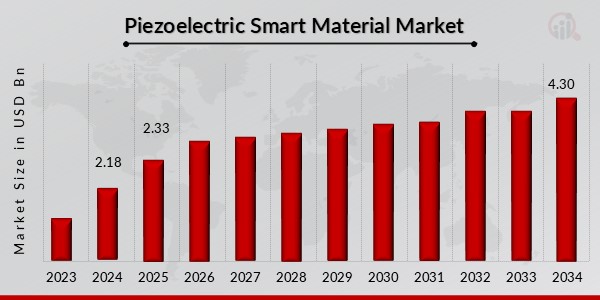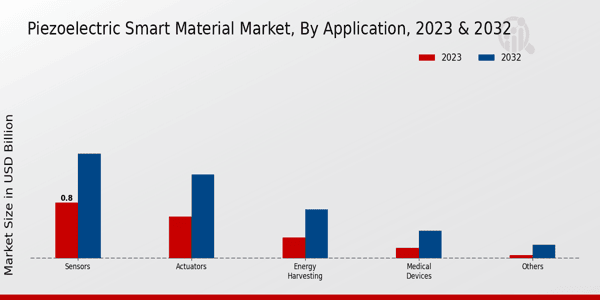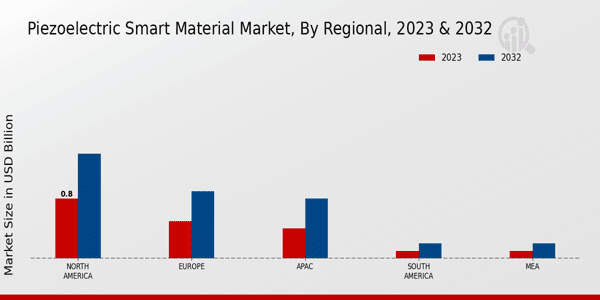Global Piezoelectric Smart Material Market Overview
The Piezoelectric Smart Material Market Size was estimated at 2.18 (USD Billion) in 2024. The Piezoelectric Smart Material Industry is expected to grow from 2.33 (USD Billion) in 2025 to 4.30 (USD Billion) by 2034. The Piezoelectric Smart Material Market CAGR (growth rate) is expected to be around 7.01% during the forecast period (2025 - 2034).
Key Piezoelectric Smart Material Market Trends Highlighted
The Piezoelectric Smart Material Market is rapidly evolving, driven by increasing applications in consumer electronics, automotive, and healthcare sectors. The demand for energy-efficient technologies has spurred interest in piezoelectric materials, which convert mechanical stress into electrical energy. This conversion capability is essential for the development of innovative devices, like sensors, actuators, and self-powered systems, contributing to market growth. Furthermore, advancements in material science are leading to the creation of more efficient and versatile piezoelectric materials, thereby enhancing performance and driving adoption across various industries.
Several opportunities are emerging within the market that can be explored for future growth. Expansion into emerging markets presents a significant avenue for companies looking to capitalize on the increasing demand for advanced materials in industries such as robotics and renewable energy. Additionally, the integration of piezoelectric materials in IoT devices offers potential for innovative applications such as smart homes and industrial automation. Collaborative efforts between research institutions and industry players could lead to breakthroughs in novel materials and applications, encouraging investment and technology development.
Recently, trends in the piezoelectric smart materials landscape have shown a shift towards sustainability and eco-friendly solutions.
Policymakers and consumers alike are focusing more on environmentally friendly technologies, prompting manufacturers to invest in green production methods. There is a growing interest in multifunctional materials that offer enhanced performance and could serve multiple applications, which further supports the market. The trend towards miniaturization in consumer electronics also aligns with the need for reliable, small-scale piezoelectric solutions, thereby expanding their utility and appeal. As technology continues to advance, the Piezoelectric Smart Material Market will likely see significant developments driven by these ongoing trends.

Source: Primary Research, Secondary Research, MRFR Database and Analyst Review
Piezoelectric Smart Material Market Drivers
Growing Demand for Advanced Sensors and Actuators
The Piezoelectric Smart Material Market Industry is witnessing a significant rise in demand for advanced sensors and actuators across various sectors. This is primarily driven by the increasing need for precise measurements and control in applications such as automotive, aerospace, healthcare, and consumer electronics. With the ongoing evolution of technology, these devices are becoming more sophisticated, requiring materials that can offer enhanced capabilities such as improved sensitivity, miniaturization, and energy efficiency.
Additionally, the surge in the Internet of Things (IoT) and automation trends further propels the growth of piezoelectric materials as manufacturers seek to integrate these components into smart systems. These advancements are essential in creating devices that can operate in extreme conditions, making piezoelectric materials indispensable. In the automotive sector, they play a crucial role in applications like pressure sensors, vibration monitoring, and noise reduction systems.In healthcare, piezoelectric materials are increasingly used in ultrasound equipment and other diagnostic tools, providing better patient outcomes and supporting advanced treatments.
The versatility and adaptability of piezoelectric smart materials cater to the growing preferences for sustainable and effective solutions, thereby solidifying the demand in the market.
Rising Adoption of Renewable Energy Applications
As the world increasingly focuses on renewable energy solutions, the Piezoelectric Smart Material Market Industry is benefiting greatly from this trend. Piezoelectric materials are being utilized in various renewable energy applications, including energy harvesting systems that convert mechanical energy from vibrations and movements into electrical energy. This technology allows for the powering of sensors and devices in places where traditional power sources are either impractical or too costly.
The adoption of piezoelectric energy harvesting systems supports sustainable development and reduces reliance on fossil fuels, which is vital for meeting global energy demands. Furthermore, governments and organizations are investing in research and development to enhance the efficiency and cost-effectiveness of these materials, paving the way for broader applications in the energy sector.
Advancements in Material Fabrication Technologies
Innovations in fabrication technologies are driving the expansion of the Piezoelectric Smart Material Market Industry. Improved manufacturing processes have made it possible to produce high-performance piezoelectric materials more efficiently and at lower costs. Techniques such as 3D printing and the development of new composite materials allow for the creation of complex geometries and structures that enhance the functional capabilities of piezoelectric devices.
These advancements not only boost the performance of existing applications but also open new avenues for the incorporation of piezoelectric materials into emerging technologies and products. As manufacturers advance their production techniques, they are better equipped to meet diverse industry needs, fostering growth in the piezoelectric sector.
Piezoelectric Smart Material Market Segment Insights:
Piezoelectric Smart Material Market Application Insights
The Piezoelectric Smart Material Market is poised for significant growth within its Application segment, illustrating a robust valuation of 1.9 USD Billion in 2023 and projected to reach 3.5 USD Billion by 2032, showcasing the increasing adoption of advanced materials in various industries. The segmentation of this market reveals a clear dominance of the Sensors category, which holds a majority share with a value of 0.8 USD Billion in 2023 and is expected to grow to 1.5 USD Billion in 2032. This is largely attributed to the rising demand for precision measurement and monitoring across sectors such as automotive and healthcare.
Actuators also play a significant role in the market, valued at 0.6 USD Billion in 2023, which is anticipated to expand to 1.2 USD Billion by 2032, driven by the need for automated systems and robotics in manufacturing processes. The Energy Harvesting segment, valued at 0.3 USD Billion in 2023, is expected to grow to 0.7 USD Billion by 2032.
This growth reflects an increasing focus on sustainable energy solutions and self-powered devices, which are becoming essential in various applications ranging from consumer electronics to environmental monitoring.In the Medical Devices segment, valued at 0.15 USD Billion in 2023 and projected to increase to 0.4 USD Billion by 2032, the use of piezoelectric materials is gaining traction due to their unique ability to convert mechanical stress into electrical energy, enabling them to play vital roles in diagnostics and rehabilitation technologies.
The category labeled as Others, with a valuation of 0.05 USD Billion in 2023, is expected to grow to 0.2 USD Billion by 2032, capturing niche applications that are emerging alongside advancements in piezoelectric materials.
The market trends indicate an overall favorable environment for the growth of Applications driven by the expanding electronics sector, government initiatives for smart materials, and innovation in piezoelectric technologies. Nevertheless, challenges such as manufacturing complexities and high-performance demands need to be addressed to ensure sustained market growth. Overall, the Piezoelectric Smart Material Market in the Application segment presents a dynamic landscape characterized by significant growth potential influenced by key applications like Sensors and Actuators, both of which are vital for the advancement of automation and smart technologies across multiple sectors.

Source: Primary Research, Secondary Research, MRFR Database and Analyst Review
Piezoelectric Smart Material Market Material Type Insights
The Piezoelectric Smart Material Market, valued at 1.9 USD Billion in 2023, is steadily evolving, with significant developments in various material types, including Ceramic, Polymer, Composite, and Single Crystal. Ceramic materials have historically dominated this segment due to their high piezoelectric coefficients and widespread use in applications ranging from sensors to actuators. Meanwhile, the Polymer segment is gaining traction owing to its flexibility and lightweight nature, making it suitable for diverse applications in consumer electronics and biomedical devices.
Composite materials are also becoming increasingly significant as they combine properties of different materials to enhance performance and expand application possibilities. Single Crystal piezoelectric materials, known for superior performance, are particularly essential in high-end applications such as aerospace and defense, thus driving innovation and technological advancements in the market. The evolving demand for miniaturization and enhanced performance across various industries contributes to the growth of these material types within the overall Piezoelectric Smart Material Market, indicating promising trends for market expansion and innovation.
Piezoelectric Smart Material Market End Use Industry Insights
The Piezoelectric Smart Material Market is poised for growth, with a valuation of 1.9 USD Billion in 2023, reflecting a strong performance within various End Use Industries. This market segment encompasses diverse applications, including Aerospace, Automotive, Consumer Electronics, Healthcare, and Industrial sectors. Each of these areas contributes significantly to the overall market landscape, with Aerospace benefiting from advanced propulsion systems and structural monitoring applications while the Automotive sector leverages piezoelectric materials for enhancing vehicle performance and safety.In Consumer Electronics, there is growing utilization for sensors and actuators catering to smart devices.
The Healthcare sector relies on these materials for medical imaging and diagnostic equipment, highlighting their critical role in improving patient care. Lastly, the Industrial segment is expected to benefit from automation and robotics integration. This diversification in applications presents numerous growth opportunities while also posing challenges, such as material limitations and the need for innovation in manufacturing processes. The Piezoelectric Smart Material Market statistics underscore the relevance of these industries in driving market trends and growth prospects through 2032.
Piezoelectric Smart Material Market Form Factor Insights
The Piezoelectric Smart Material Market, valued at 1.9 USD Billion in 2023, showcases a robust segmentation in the Form Factor category, which includes Flexible, Rigid, Thin Film, and Bulk materials. These diverse categories reflect the adaptability and functionality of piezoelectric materials in various applications, from consumer electronics to industrial sensors. The Flexible form factor is gaining traction due to its suitability for wearable technology and flexible electronics, offering significant potential for innovation.
Rigid materials, on the other hand, are widely used in structural health monitoring and acoustic applications, underlining their importance in safety and efficiency.Thin Film technology plays a critical role in microelectromechanical systems (MEMS), leading to advancements in miniaturization. Bulk materials dominate the market as they provide superior performance for high-power applications.
Overall, the segmentation of the Piezoelectric Smart Material Market drives market growth by catering to specific industry requirements, thus providing multiple opportunities for development and investment across varied segments. These insights into the Piezoelectric Smart Material Market data reveal emerging trends that continue to shape the industry landscape.
Piezoelectric Smart Material Market Regional Insights
The Piezoelectric Smart Material Market revenue showcases significant growth across various regions, with the overall market valued at 1.9 USD Billion in 2023, expected to reach 3.5 USD Billion by 2032. North America, holding a majority share, is valued at 0.8 USD Billion in 2023 and is anticipated to grow to 1.4 USD Billion by 2032, driven by advancements in technology and increasing applications in aerospace and healthcare sectors.
Europe follows with a value of 0.5 USD Billion in 2023 and is projected to reach 0.9 USD Billion, benefitting from stringent environmental regulations that favor the adoption of such materials.The APAC region, valued at 0.4 USD Billion, is expected to expand rapidly, primarily due to rising industrialization and demand for smart devices, growing to 0.8 USD Billion. South America and MEA collectively contribute smaller shares, each valued at 0.1 USD Billion in 2023 and projected to grow to 0.2 USD Billion.
The market dynamics reveal that regions like North America and Europe dominate due to their technological advancements while emerging economies in APAC present growth opportunities amid increasing manufacturing activities. The Piezoelectric Smart Material Market statistics reflect a diverse landscape shaped by regional demands and technological innovations, highlighting a promising growth trajectory.

Source: Primary Research, Secondary Research, MRFR Database and Analyst Review
Piezoelectric Smart Material Market Key Players and Competitive Insights:
The Piezoelectric Smart Material Market has witnessed a remarkable evolution, driven by advancements in technology and a burgeoning demand across various applications. This market is characterized by intense competition among key players who continuously strive to innovate and enhance their offerings. The competitive landscape is shaped by factors such as product quality, technological advancements, strategic partnerships, mergers and acquisitions, and geographical expansion. As industries increasingly adopt automation and smart systems, the demand for piezoelectric materials is expected to grow, leading to a dynamic and robust competitive environment.
Companies are leveraging their research and development capabilities to introduce cutting-edge products, thereby enhancing their market presence and gaining a competitive edge.PI Ceramic has carved out a significant presence within the Piezoelectric Smart Material Market, showcasing its strengths in technology and innovation.
The company is renowned for its high-quality piezoelectric ceramics that are utilized in a multitude of applications, ranging from medical devices to industrial sensors. PI Ceramic's commitment to research and development is evident in its continuous efforts to advance material properties and expand product capabilities. By focusing on superior performance and reliability, PI Ceramic has established a strong reputation among its clientele, thus solidifying its foothold in the market. Furthermore, the company's strategic collaborations with other industry leaders enable it to enhance its product portfolio and address the evolving demands of the market more effectively.
Piezotech stands out as a prominent player in the Piezoelectric Smart Material Market, known for its expertise in the development of piezoelectric polymers. The company specializes in creating high-performance materials that cater to diverse applications, including actuators, sensors, and energy-harvesting devices. Piezotech's focus on innovation and the continual improvement of material properties positions it as a key competitor, allowing it to meet specific customer requirements efficiently. The company's research initiatives aimed at enhancing the functionality and performance of its smart materials further bolster its competitive advantage.
Piezotech's ability to respond to market needs with tailored solutions reinforces its role as a vital component of the piezoelectric industry, contributing to the overall growth and advancement of the market.
Key Companies in the Piezoelectric Smart Material Market Include:
Piezoelectric Smart Material Market Industry Developments
Recent developments in the Piezoelectric Smart Material Market have indicated an upward trend in demand, particularly driven by advancements in electronic devices and renewable energy sectors. Companies such as PI Ceramic, Piezotech, and CeramTec are expanding their production capabilities to meet this escalating demand. Thales Group has recently focused on enhancing its piezoelectric solutions for aerospace applications, which has positioned it strongly in the market. Notably, Toshiba and Honeywell are collaborating on innovative smart material applications, suggesting a stronger integration of piezoelectric technology in various industries.
Moreover, recent mergers and acquisitions have also shaped the market landscape. Texas Instruments has made strategic acquisitions to bolster its product offerings in piezoelectric materials, contributing to its growing market presence. Kyocera's consolidation efforts in this sector have also signaled increased investment in research and development. The growth in market valuation of companies like Meggitt and Kistler has further reinforced confidence in the region's direction, with significant impacts felt in sectors like automotive and healthcare. Overall, the Piezoelectric Smart Material Market is evolving rapidly, with enhancements in technology and strategic partnerships driving its expansion.
Piezoelectric Smart Material Market Segmentation Insights
-
Piezoelectric Smart Material Market Application Outlook
-
Piezoelectric Smart Material Market Material Type Outlook
-
Piezoelectric Smart Material Market End Use Industry Outlook
-
Piezoelectric Smart Material Market Form Factor Outlook
-
Piezoelectric Smart Material Market Regional Outlook
| Report Attribute/Metric |
Details |
| Market Size 2024 |
2.18 (USD Billion) |
| Market Size 2025 |
2.33 (USD Billion) |
| Market Size 2034 |
4.30 (USD Billion) |
| Compound Annual Growth Rate (CAGR) |
7.01% (2025- 2034) |
| Report Coverage |
Revenue Forecast, Competitive Landscape, Growth Factors, and Trends |
| Base Year |
2024 |
| Market Forecast Period |
2025- 2034 |
| Historical Data |
2020 - 2024 |
| Market Forecast Units |
USD Billion |
| Key Companies Profiled |
PI Ceramic, Piezotech, CeramTec, Thales Group, Texas Instruments, Toshiba, Honeywell, Kyocera, Noliac, Meggitt, CEDRAT Technologies, Kistler, APC International, Sensata Technologies, Mide Technology |
| Segments Covered |
Application, Material Type, End Use Industry, Form Factor, Regional |
| Key Market Opportunities |
Rising demand for energy harvesting, Growth in medical device applications, Increasing use in automotive sensors, Advancements in consumer electronics, Expanding applications in robotics |
| Key Market Dynamics |
Increasing demand for electronics, Growth in renewable energy applications, Advancements in healthcare technology, Rising automation in industries, Emerging markets expansion |
| Countries Covered |
North America, Europe, APAC, South America, MEA |
Frequently Asked Questions (FAQ):
The Global Piezoelectric Smart Material Market is expected to be valued at 4.30 USD Billion by 2034.
The expected CAGR for the Global Piezoelectric Smart Material Market from 2025 to 2034 is 7.01%.
North America is projected to have the largest market size, valued at 1.4 USD Billion in 2032.
The Sensors application market is estimated to be valued at 0.8 USD Billion in 2023 and 1.5 USD Billion in 2032.
Key players include PI Ceramic, Piezotech, CeramTec, Thales Group, and Texas Instruments, among others.
The Actuator's application is expected to grow from 0.6 USD Billion in 2023 to 1.2 USD Billion in 2032.
The Energy Harvesting application is anticipated to reach a market value of 0.7 USD Billion by 2032.
Europe's market size is projected to increase from 0.5 USD Billion in 2023 to 0.9 USD Billion in 2032.
The Medical Devices application is expected to be valued at 0.15 USD Billion in 2023 and grow to 0.4 USD Billion by 2032.
Challenges include competition among key players and potential supply chain disruptions affecting material availability.

















